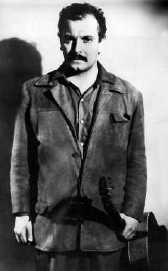George Brassens wrote
"J'ai quitté la vi' sans rancune, j'aurai plus jamais mal aux dents,
Me v'là dans la fosse commune, la fosse commune du temps."
"I've left this life with no rancour, I'll never have toothache again,
Now I lie in the communal grave, the communal grave of time."
That's a quote from Brassens' song 'Le testament', his 'Last will and testament'.Georges Brassens (1921-1981) is as well-known in France today as The Beatles are in England. People whistle his melodies on the streets, pass them on through generations. His bittersweet lyrics won him the French national poetry prize. He popularised French poetry in music. People respect him as le bon maître/the good master and regard him with affection as tonton Georges/uncle George and notre nounours national/our national teddy bear.

He said
"I would like everyone to understand that they can be creators, that they are creators.
The context isn't important, it's to help a world to exist, to be born."
In 2001, to mark the twentieth anniversary of Georges Brassens' death on 29th October 1981, English poet Lesley Lawn wrote a poem about Georges Brassens, set to music by Charlie Hearnshaw, called "Le choix."
What they say about Georges Brassens
"Brassens...sang at the world as if it were an old lover whose ways are teasingly familiar, and from whom not too much is expected...he was France's greatest and wisest singer, and we should visit him...in whatever way we can."
Julian Barnes, "Something to Declare", Picador 2002
"A few years ago, in the course of a literary discussion, someone asked who was the best poet at the moment in France. I responded without hesitation: Georges Brassens."
Gabriel Garcia Marquez, Nobel Prize for Literature 1981
"I believe it is a mortal sin not to listen to Brassens."
Jacques Brel, songwriter
Brassens had never performed outside France until, at the invitation of his friend, French lecturer Colin Evans, he visited Wales to present one concert at Cardiff's Sherman Theatre in 1973. The BBC filmed the performance and in 1975 broadcast excerpts within a programme about Brassens' life and work.
"5th May 1975. On TV, George Brassens first and only concert in England (sic). He sings the great love song I first heard him sing twenty years ago and should have acted on: 'J'ai l'honneur de ne pas te demander ta main.' A man introducing the programme acutely says that, whereas English popular music was overrun and conquered by America in the thirties, forties and fifties, France remained immune; hence the pure tradition represented by people like Brassens."
From 'The diaries of Kenneth Tynan' edited by John Lahr, Bloomsbury 2001
Colin Evans has kindly allowed us to reproduce here his introduction to Georges Brassens from the programme notes for that concert in 1973.
Programme notes
Sherman Theatre Cardiff, October 28th 1973
"Every night for three months last winter Brassens filled to overflowing the Bobino theatre in Montparnasse. (1,400 seats). I was there on the last night. Outside people queued in vain. Inside they stood five deep at the back of the theatre. Brassens appears after the interval, and stands by a wooden chair, his right hand making embarrassed slowing down movements when the applause doesn't stop. The lighting is flat. Then he puts a foot on the chair and begins his first song.
"A theatre is not the lighting and the sound equipment but the hush that falls when a large number of individuals is fused into a group, concentrating on another human being's voice and on a form of language which both is and is not their own.
"At midnight people pour out into the Rue de la Galté. As Giraudoux says about the effect that good theatre has on an audience: "Like a warm iron on sheets, a style has passed over them, they are all crumpled by the week's work and now they are all smooth."
"Brassens is quite simply the greatest living poet-singer. He only appears in public every three years, each time with just ten new songs. His words are the result of months of writing and rewriting. He commands a vast range of vocabulary and metre. Since his schooldays he has been steeped in what he calls the "real" poets, from Villon to Valéry. But however far he moves into literature his language is always rooted in the rich soil of everyday usage and he stands firmly in the age-old tradition of irreverent popular art. His music, varied, inventive, is the vehicle for the poetry as music always has been in a popular, oral tradition.
"He radiates integrity, wholeness. We are surrounded by electronic artefacts and synthetic creations, but here is a live human being speaking of familiar things, love and friendship, old age and death, with humour and without sentimentality, always saying less than what he is feeling, presenting an imaginary world and imaginary characters which we still recognise. This is poetry with a human face.
"Brassens has never before agreed to sing outside France where he has his roots and his language. We are privileged that he should have broken this rule to sing to us in the Sherman tonight."
Colin Evans